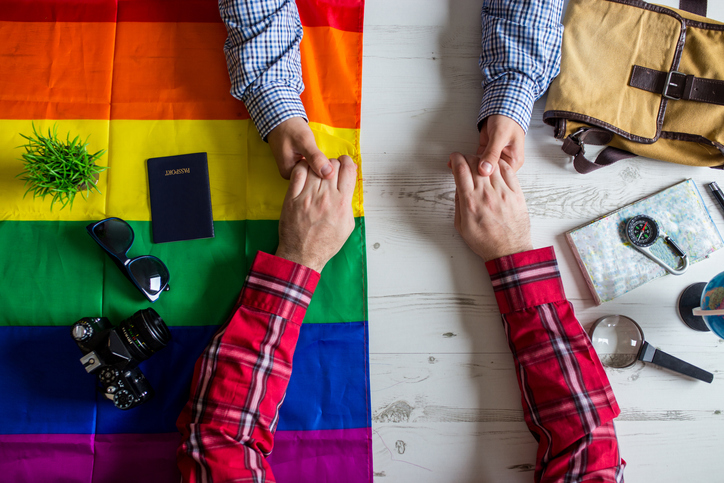Author: Evan Garfield
Safety is a key concern for risk managers and travelers alike. For many organizations, attention is typically allocated to issues such as crime, terrorism, political instability, natural disasters, and health risks in preparation for travel. There is no question these are important areas to look at when assessing travel risk. However, there is also a need for awareness regarding travel safety for LGBTQ+ travelers and the unique challenges they may face abroad. In this piece, we detail special considerations regarding LGBTQ+ travel safety and share resources to support and assist your LGBTQ+ travelers before and during their trips abroad.

Research
Experiences for LGBTQ+ travelers can vary globally, so it is important for administrators to understand where constituents are traveling and the resources available to them, to help better ensure travelers have a safe and enjoyable trip.
First and foremost, both risk managers and travelers should gather information about their destination prior to travel. It is important to understand the cultural, legal, and security issues that affect the LGBTQ+ community in the locations constituents are traveling. Travelers do not necessarily have to avoid these locations, but they should nonetheless be aware of local laws and cultural attitudes.
Local Laws
In many countries, identifying as LGBTQ+ is considered illegal. According to the World Economic Forum (WEF), there are over 70 countries where homosexuality is illegal. In eight of those countries, homosexuality is punishable by death. Individuals can be barred from entering a country or face arrest if they are suspected of engaging in or promoting homosexual behavior. Members of the LGBTQ+ community have been detained for simply waving the rainbow LGBTQ+ pride flag at events. Others have been entrapped by local law enforcement and even blackmailed for using LGBTQ+ dating apps, such as Grindr. For some countries, specifically identifying as LGBTQ+ is not illegal by law, but individuals may nonetheless be prosecuted under “indecency charges.” Due to threat of legal action, some hotels may even require LGBTQ+ couples to book a room with two beds rather than one.
Societal Attitudes
While conducting research on a destination’s legal stance toward the LGBTQ+ community is important, travelers should also be aware that local laws and societal attitudes are not the same. Although identifying as LGBTQ+ may be legal in some societies, it may nevertheless be frowned upon. Displays of affection considered innocent by Western standards, like touching or holding hands, may be against cultural or religious practices, even for heterosexual couples in other countries.
Transgender travelers are confronted with additional considerations. Some countries may refuse entry to individuals whose documented gender does not reflect their appearance. Security procedures at airports, such as pat downs and body scanners, can be distressing for transgender travelers. Transgender individuals should consider reading this guide on effectively navigating the TSA screening process.
Dialogue
Risk managers across all sectors should create pathways that empower travelers to come forward with concerns regarding LGBTQ+ travel safety while allowing them to maintain confidentiality. Establishing such channels can encourage LGBTQ+ individuals to ask questions and address concerns before travel. Furthermore, organizations should establish a local contact or a travel risk management partner available for LGBTQ+ travelers if they feel unsafe abroad.
Security
As a general rule for all travelers, staying aware of surroundings and remaining discreet is the safest option when traveling to a new location. All travelers, including LGBTQ+ travelers, should be mindful of the accepted dress code and avoid public displays of affection. Furthermore, travelers should use a Virtual Private Network, or VPN, when using the Internet in restrictive countries to avoid any monitoring by the host government. As a precaution, travelers should be careful of any information uploaded to social media. In more accepting regions, LGBTQ+ travelers are still encouraged to use discretion if disclosing personal information.
Resources
IGLTA: The International Gay & Lesbian Travel Association is the oldest LGBTQ+ professional association, representing travel and hospitality providers on six continents. IGLTA’s members include LGBTQ+ friendly accommodations, transport, destinations, service providers, travel agents, tour operators, events, and travel media located in over 80 countries. Their weekly email newsletter is a good resource for news of interest for LGBTQ+ travelers.
SCRUFF: SCRUFF is an LGBTQ+ social dating app that allows locals to answer travel questions for visitors to their cities, and allows users to post upcoming trips so they can connect in advance with locals and other travelers. This resource offers information on more than 90 countries where it is dangerous for LGBTQ+ travelers and helps educate on local laws and attitudes. The app has alerts with the most salient laws and their details, including excerpts from actual legal code based on research done annually by ILGA.
GEOSURE: GeoSure is an application that provides safety data for travelers, including an LGBTQ+ category. With coverage for over 30,000 neighborhoods around the world, GeoSure’s LGBTQ+ ratings help travelers get a sense of how safe it is to be open about their sexual orientation and gender identity around the world.
Want to learn more about travel safety and holistic risk management? Contact us today.




